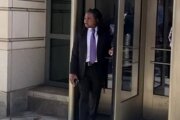Federal student loan payments resumed in October just ahead of the holiday season, so it may not come as a surprise that most Americans with college loan debt plan to spend less money this year on family gatherings, festive trimmings and gift-giving, according to a November survey from U.S News. And while it may be a blue Christmas for student loan borrowers, the financial strain of loan repayment doesn’t end once the holidays are over.
Between Nov. 17 and 27, U.S. News ran a nationwide survey of 1,202 former college students with federal student loan debt, conducted through PureSpectrum. We asked respondents a series of questions about how their finances have changed since the three-year student loan forbearance ended, including what it means for their holiday budget, whether they’ve been making payments and how student loan repayment is impacting their financial well-being. Here’s what we found:
— Most federal student loan borrowers (72%) say repayment has dampened their holiday spirit. Three in four (76%) believe the resumption of student loan payments will cut into their holiday spending budget. Over half (54%) say they’ll spend less on gifts for loved ones, 41% will trim their holiday meals and 33% won’t be able to travel to see friends or family.
— Over a third of borrowers (37%) haven’t been making payments since forbearance ended. Among them, 31% applied for deferment, while 24% applied for forbearance — but nearly half (45%) say, “I just haven’t paid my loans.” Of concern, 42% of borrowers say they’ve had difficulty communicating with their servicer since payments resumed.
— Nearly two-thirds of respondents (64%) have missed payments on other bills due to student loan repayment, including credit card payments (37%), housing payments like rent or mortgage (27%) and auto loan payments (23%). Some respondents say that they’ve become delinquent on other bills, like personal loans or utilities.
— The vast majority (80%) have had to cut back on spending since student loan payments resumed. Additionally, 75% of federal student loan borrowers have had to reduce their savings, including contributions to their emergency fund (52%), their homebuying fund (26%) and their retirement fund (25%).
— Student loan repayment has changed borrowers’ credit card habits for the worse: 38% say they used to pay the statement balance in full, but now they just make the minimum payment. A third (33%) are now more reliant on credit cards to make ends meet, and 24% say they’ve added to their revolving balance. Just a quarter (25%) say their credit card spending habits haven’t changed.
[Read: Best Student Loan Refinance Lenders.]
An Unwanted Gift: Student Loans for the Holidays
The holidays can already be a time of financial stress for merrymakers who renounce their otherwise-balanced budgets in the spirit of giving. This holiday season, money is even tighter for student loan borrowers who were recently saddled with an extra monthly bill for the first time in three years. Three in four borrowers (76%) say that the resumption of student loan payments will cut into their holiday spending budget. Among them:
— 54% will cut spending on holiday gifts for loved ones.
— 41% will spend less on holiday meals like Thanksgiving or Christmas dinner.
— 33% won’t be able to travel to see friends or family.
— 28% won’t be able to buy holiday decorations.
— 27% won’t be able to host holiday gatherings.
Compared with previous holiday seasons, 62% of student loan borrowers believe they’ll spend less money this year, while just 13% think they’ll spend more. About a quarter (26%) say they’ll spend about the same amount. In general, the vast majority of federal student loan borrowers (80%) have had to reduce their overall spending due to the resumption of student loan payments.
That being said, it’s no wonder why 72% of student loan borrowers say the resumption of payments has dampened their holiday spirit.
Post-Forbearance, Many Student Loan Borrowers ‘Just Haven’t Paid’
About two-thirds of federal student loan borrowers have been making payments since forbearance ended, but over a third (37%) haven’t. And there’s a significant correlation between student loan repayment and degree obtained.
Borrowers with a master’s degree or higher are the most likely to make payments on their student loans, at 76%. Over two-thirds of those with an associate or bachelor’s degree (68%) have been paying their loans. But just 31% of borrowers who didn’t graduate or obtain a degree are making student loan payments.
Among student loan borrowers who haven’t been making payments, 55% applied for forbearance or deferment, while 45% say, “I just haven’t paid my loans.”
The Education Department has paused adverse collections activity during a 12-month on-ramp to repayment program, but when that expires in October 2024, student loan delinquency will have consequences — especially for those with extended periods of nonpayment. Borrowers who don’t pay their student loans for nine months go into default, which can result in serious credit damage, loan acceleration and wage garnishment.
[Related:How to Lower Your Student Loan Payments]
The Return of Student Loans Reveals Hidden Financial Strain
Student loan forbearance gave borrowers the opportunity to catch up on other financial goals during the COVID-19 pandemic, according to an August U.S. News survey conducted before payments resumed. But now that relief has ended, borrowers are saving less money, missing payments on other bills and becoming increasingly reliant on credit cards.
Three-quarters of student loan borrowers (75%) have had to pull back on savings due to the resumption of student loan payments. Over half (52%) have cut their emergency savings, and 26% are putting less toward their homebuying fund. A quarter (25%) have reduced their retirement contributions.
Of concern, 64% of borrowers have missed payments or become delinquent on other bills because forbearance ended, including credit card payments (37%), housing payments (27%) and/or auto loan payments (23%). A small number of borrowers cite other bills they’ve missed, like personal loan payments and utility bills.
Perhaps unsurprisingly, student loan borrowers are increasingly turning to plastic as other bills pile up. Three-quarters of borrowers (75%) say the resumption of student loan payments has negatively impacted their credit card spending habits:
— 38% say, “I used to pay my statement balance in full, but now I just make the minimum payment.”
— 33% say, “I’ve become more reliant on my credit cards to make ends meet.”
— 24% say, “I’ve added to my revolving credit card balance.”
On the other hand, a quarter (25%) say their credit card spending habits haven’t changed or they don’t use a credit card.
[Read: 15 Companies That Help Pay Off Student Loans]
Tips for Student Loan Borrowers Struggling in Repayment
Let’s zoom out and take a look at these alarming survey results in the lens of behavioral economics. During forbearance, did student loan borrowers adopt a financial lifestyle they couldn’t sustain? Or were borrowers always this strapped because of their debt, and it’s only become apparent now that payments have resumed?
Whether student loan borrowers have inherently changed, or whether the economy around them has driven them to change, our findings make one thing clear: Many student loan borrowers are worse off financially since student loan payments restarted. Here’s what you can do if you’re struggling to manage your finances amid student loan repayment:
— Get in touch with your student loan servicer. If you can’t make payments, your servicer can help you understand your options for temporary payment relief (like enrolling in forbearance or deferment), as well as more lasting loan modifications (like consolidating your federal student loans and switching to a different repayment plan). You can find your servicer’s contact information by signing into your account on the Federal Student Aid website. FSA also has a loan simulator that can help you determine the best payment plan for your immediate and long-term needs.
— Take a closer look at your monthly budget. There are plenty of free budgeting apps that can help you track your spending. Some of them allow you to link your bank accounts, cancel monthly subscriptions and create notifications if you’ve overspent in a certain category. You can also enlist the help of a nonprofit credit counselor who can provide free or low-cost financial guidance through the National Foundation for Credit Counseling.
— Ask for help when you need it. If you’re at the point where you’re considering skipping a utility bill or maxing out your credit card to pay for groceries, don’t wait until you’re completely out of options — it’s time to seek help now. Just because you have a roof over your head and clothes on your back doesn’t mean you’re overqualified to visit a food pantry. Seeking charitable aid can help you get your finances under control before you’ve reached the point of desperation, even if you feel that other people need it more. Visit your local department of social services and Benefits.gov to get the help you need.
More from U.S. News
Survey: Student Loan Borrowers Brace for Financial Uncertainty in Repayment
Survey: 43% of Parents Regret Borrowing Student Loans for Their Children
Two-Thirds of Private Student Loan Borrowers Who Refinanced Say It Improved Their Finances
Holidays on Hold: Student Loan Repayment Has Borrowers Trimming Budgets originally appeared on usnews.com







